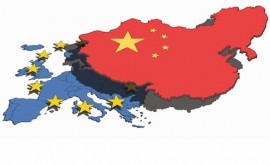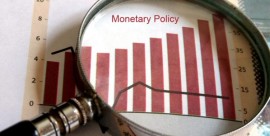- Fecha(s): 15/03/2016
- Lugar: UNED con RETRANSMISION EN DIRECTO POR EL AULA VIRTUAL
- Ponente: Rafael Barquín (UNED)

Abstract: Convencionalmente se suelen clasificar los efectos de la construcción de una infraestructura de transporte en backward linkages, o efectos hacia atrás, y forward linkages, o efectos hacia delante. Estos últimos son medidos a través del contrafactual conocido como “Ahorro Social”. La bibliografía española ha puesto de relieve que los backward linkages de la construcción de sistema ferroviario español…
- Fecha(s): 04/03/2016
- Lugar: Aula seminario de Fundamentos del Análisis Económico, Facultad de Economía y Empresa, Universidad de Murcia
- Ponente: Asier Mariscal

Abstract: We uncover new dynamic patterns related to importers age and the macroeconomic environment that static models cannot explain. Our patterns are related to import switching, i.e., the simultaneous adding and dropping of intermediates at the firm level. Three facts stand out. First, switching is pervasive as 65% of firms do it and, at the…
- Fecha(s): 18/02/2016
- Lugar: Seminario del Departamento de Economía Aplicada, UMU. Se retransmitirá en directo.
- Ponente: Manuel Pérez-García

Abstract: In the last decade the approaches of the global history have been emphasized in order to visualize the progress, form and method which historians have undertaken when carrying out ambitious research projects to analyse and compare diverse geographical and cultural areas of Asia and Europe. But when dealing with comparisons and cross-cultural studies in…
- Fecha(s): 12/02/2016
- Lugar: Aula Seminario Tino Martínez Gallur (Fundamentos del Análisis Económico) B2/02 (retransmisión en directo prevista)
- Ponente: Manuel García-Santana (Universidad Pompeu Fabra)

Abstract Spanish GDP grew at an average rate of 3.5% per year during the expansion of 1995- 2007, above the EU average of 2.2%. However, this growth was based on factor accumulation rather than productivity gains. In particular, TFP fell at an annual rate of 0.7%, while it increased at 0.4% in the EU and…
- Fecha(s): 11/02/2016
- Lugar: Seminario del Departamento de Métodos Cuantitativos para la Economía y Empresa, UMU. Retransmisión en directo pendiente de confirmación.
- Ponente: Matteo Ciccarelli, Banco Central Europeo Frankfurt

Abstract: This paper analyses the transmission of monetary policy to bank lending conditions during the period of financial and sovereign debt crisis in the euro area. A unique bank-level dataset is used to capture the main channels through which standard and non-standard monetary policy measures propagates to the lending behaviour of individual banks. The results…
- Fecha(s): 22/01/2016
- Lugar: Seminario del Departamento de Métodos Cuantitativos para la Economía y Empresa, UMU. Retransmisión en directo pendiente confirmar.
- Ponente: Rafael Valero. Universidad de Alicante

Abstract The aim of this paper is to create counterfactual series in a reliable way and illustrate its use. The present literature is dominated by the Synthetic Control Method (SCM), but there are cases where it cannot perform and it was not created considering the trade-off between bias and variance, hence the accuracy of results…
- Referencia: y Feijóo, C: “Techno-economic implications of the mass-market uptake of mobile data services: Requirements for next generation mobile networks”. 2016, Telematics and Informatics. An interdisciplinary journal on the social impacts of new technologies, vol. 33, nº 2, pp. 600-612.
ABSTRACT The growth of the mobile data services market is no longer dependent on push strategies from suppliers. On the contrary, demand is now driving the market to the extent that it will not be easy for mobile operating companies to cope up with the demand to come in the near future. Operators are forced…
- Fecha(s): 04/12/2015
- Lugar: Seminario del Departamento de Métodos Cuantitativos para la Economía y Empresa, UMU. Retransmisión en directo.
- Ponente: José A. García-Martínez, Universidad Miguel Hernández

Abstract This paper proposes a theory of media silence. The argument is that news organizations have the power to raise public concern and so affect the probability that there is ex-post verification of the true state of the world. Following the seminal article by Gentzkow and Shapiro (2006), we consider a newspaper that seeks to…
- Fecha(s): 27/11/2015
- Lugar: Seminario del Departamento de Métodos Cuantitativos para la Economía y Empresa, UMU. Retransmisión en directo.
- Ponente: Mª del Mar Sánchez de la Vega, Universidad de Murcia

Abstract This paper analyzes the rejection of tax fraud in Spain before and after the Great Depression and studies the role of certain determinants of two categories: internal or individual, and contextual, social or institutional. We use a logit model obtaining that the rejection of tax evasion depends positively on individual variables such as age…
- Fecha(s): 19/11/2015
- Lugar: Seminario del Departamento de Economía Aplicada, UMU.
- Ponente: Fernando Collantes

Abstract ¿Por qué, aún tras la Segunda Guerra Mundial, persistía en la Europa mediterránea una dieta en la que los alimentos de origen animal tenían escasa importancia? El objetivo de este artículo es contribuir a responder esta pregunta a través de un estudio de las causas por las cuales el consumo de productos lácteos (una…










